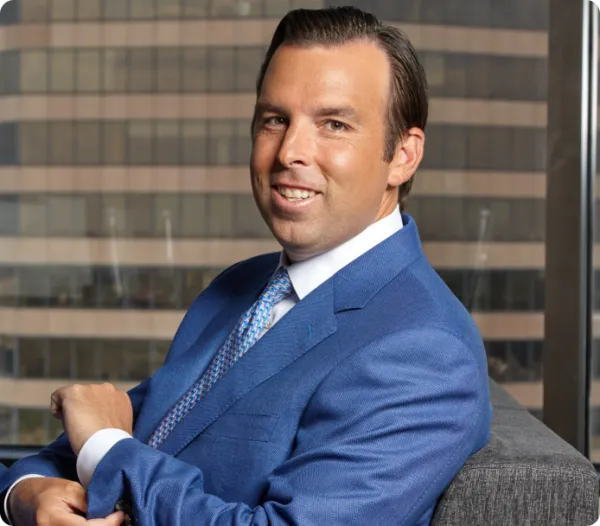
Holding corporations accountable.
We challenge unfair mass arbitration—fighting to hold corporations accountable and secure fair compensation for our clients.
Start Your ClaimThe attorney shown above may not be licensed in your state. To find an attorney licensed in your area, please visit our attorney page.

The attorney shown above may not be licensed in your state. To find an attorney licensed in your area, please visit our attorney page.
Meet Our Mass Arbitration Attorney
Our attorney has the experience and knowledge to ensure victims of corporate misconduct get the justice they deserve.
The attorneys shown in these photos may not be licensed in your state. To find an attorney licensed in your area, please visit our attorney page.
Ways We Can Help
Data Breach
In Their Words
Based on select nationwide reviews.
A large group of claimants
Binding arbitration agreements
Systematic corporate misconduct
Fighting For the People
Backed by America’s Largest Injury Law Firm.
$25 Billion
Recovered for clients
nationwide700,000+
Clients and families
served1,000+
Attorneys across
the country1
Click may change your life

The attorney featured above is licensed in Florida. For a full list of attorneys in your state please visit our attorney page.
Results may vary depending on your particular facts and legal circumstances.
Common Terms in Mass Arbitration Cases
Arbitration Clause
Mass Arbitration
Arbitrator
Filing Fees
Class Action Waiver
Learn More
Injured and not sure what to do next?
We'll guide you through everything you need to know.
Get answers to commonly asked questions about our legal services and learn how we may assist you with your case.
Am I eligible for a mass arbitration claim?
The following factors help determine whether you qualify for mass arbitration:
- Contractual Arbitration Clause: If your contract includes a mandatory arbitration clause, mass arbitration may be an option.
- Nature of the Claim: Claims related to consumer rights violations, employment disputes, data breaches, or unfair fees may be eligible.
- Number of Affected Individuals: If many people have similar claims against the same company, mass arbitration may be viable.
- Initial Steps: Potential claimants should gather relevant documents (contracts, correspondence, receipts) and consult a lawyer to assess eligibility.
What are the advantages of hiring a lawyer for mass arbitration?
Hiring a lawyer from Morgan & Morgan for mass arbitration comes with several key advantages, including:
Strength in Numbers
Morgan & Morgan is the largest injury law firm in the U.S., with thousands of attorneys and a nationwide presence. This allows them to take on large corporations in mass arbitration cases with the backing of significant resources and expertise.
No Upfront Costs
The firm operates on a contingency fee basis, meaning you don’t pay unless they win your case. That’s right—the Fee Is Free®. This makes high-quality legal representation accessible without financial risk.
Expertise in Complex Cases
Mass arbitration cases often involve consumer rights violations, privacy violations, employment disputes, and defective products. Morgan & Morgan’s attorneys have extensive experience handling large-scale arbitration claims against corporations that try to take advantage of consumers and employees.
Cutting-Edge Legal Technology
The firm leverages advanced case management systems to handle high volumes of claims efficiently, ensuring that each case is managed effectively without getting lost in the shuffle.
Proven Track Record Against Big Corporations
Morgan & Morgan has successfully litigated against Fortune 500 companies, recovering billions for clients. Their aggressive approach ensures that companies are held accountable, even in arbitration settings that may be designed to favor businesses.
Personalized Representation, Even in Mass Cases
Despite handling large-scale claims, Morgan & Morgan still prioritizes personalized legal strategies for each client, ensuring that your individual case gets the attention it deserves.
Nationwide Reach, Local Expertise
With offices across the country, they have the ability to represent clients all over the country, maximizing your chances of success.
By choosing Morgan & Morgan for mass arbitration, you gain a team that fights for the people—not the powerful while ensuring your case is handled with the expertise and resources needed to take on corporate giants.
Do I have to pay for a consultation with a mass arbitration lawyer?
No. Consultations at Morgan & Morgan are completely free. We believe everyone deserves access to legal advice, regardless of their financial situation.
Hiring one of our mass arbitration lawyers is easy, and you can get started in minutes with a free case evaluation on our site or by phone.
Who will be on my case team?
When you hire Morgan & Morgan, you don’t just hire a lawyer, you hire the largest injury law firm in the country with an army of over 1,000 lawyers and offices in all 50 states and Washington, D.C.
Your case will be handled by a dedicated team of professionals, including mass arbitration lawyers, paralegals, and support staff. You will be assigned a care team that includes a primary attorney who will oversee your case and ensure you receive personalized attention throughout the process.
When do I meet with my lawyer?
During the course of your mass arbitration case, your care team will provide regular updates, and prepare you for any upcoming proceedings. We are committed to maintaining open lines of communication and keeping you informed every step of the way.
How much does it cost to hire Morgan & Morgan?
Morgan & Morgan’s mass arbitration lawyers work on a contingency fee basis, meaning that there are no upfront fees or expenses until your case comes to a successful conclusion. That’s right—the Fee Is Free™, and you only pay if we win.
Our fee is a percentage of the settlement or verdict amount, ensuring we are motivated to achieve the best possible outcome for you.
What is the difference between mass arbitration and class action lawsuits?
Mass arbitration and class action lawsuits share similarities in that both involve multiple plaintiffs taking legal action against a company. However, they differ significantly in execution and impact:
- Class Action Lawsuits: A single lawsuit filed in court consolidates multiple plaintiffs’ claims into one case. The outcome applies to all involved parties, and a lead plaintiff represents the group.
- Mass Arbitration: Individual plaintiffs file separate arbitration claims against the same company, often simultaneously. This approach is used when companies include arbitration clauses in contracts that bar class actions.
- Effectiveness: Mass arbitration is beneficial when companies force arbitration in their terms of service, attempting to prevent collective litigation. It puts financial pressure on companies that would otherwise escape liability through forced arbitration.
What industries are commonly involved in mass arbitration claims?
Mass arbitration is prevalent in industries that frequently include arbitration clauses in consumer contracts. These industries can include:
- Telecommunications: Cell phone and internet providers often use arbitration clauses to limit legal disputes.
- Technology: Big tech firms with user agreements and data privacy concerns are common respondents.
- Gig Economy: Companies like ride-sharing and food delivery services impose arbitration clauses on workers.
- Finance: Banks and credit card companies use arbitration to manage disputes over fees and account management.
Consumers and workers in these industries often find themselves bound by arbitration clauses but may still have legal recourse through mass arbitration.
What are the potential outcomes and settlements in mass arbitration cases?
Successful mass arbitration cases may result in various financial and non-financial remedies, including:
- Monetary Compensation: Claimants may receive refunds, damages, or other financial relief.
- Policy Changes: Companies may be required to alter their business practices to prevent future harm.
How does mass arbitration work compared to traditional litigation?
Both mass arbitration and traditional litigation allow consumers and employees to seek justice against corporations, but they function very differently. Here’s how they compare:
Filing Process
- Mass Arbitration:
- Multiple individuals file individual arbitration claims against the same company, typically for similar grievances (hidden fees, data breaches, deceptive business practices).
- Claims are handled under the rules of private arbitration organizations like AAA or JAMS rather than going through a public court system.
- Traditional Litigation:
- Plaintiffs file lawsuits in state or federal courts, either individually or as part of a class action if many people were harmed in a similar way.
- Court procedures, motions, and discovery processes can take years before reaching a resolution.
Role of a Judge vs. an Arbitrator
- Mass Arbitration:
- Cases are heard by private arbitrators rather than judges.
- Arbitrators have significant power, and their decisions are binding with limited ability to appeal.
- Traditional Litigation:
- Cases are overseen by judges and juries in public court.
- Parties have the right to appeal if they disagree with the outcome.
Speed and Efficiency
- Mass Arbitration:
- Often faster than traditional litigation, as arbitration providers aim to resolve cases within months rather than years.
- However, if a company is hit with thousands of arbitration claims at once, it may try to delay proceedings or negotiate a mass settlement.
- Traditional Litigation:
- Courts have strict procedural timelines that often lead to long wait times.
- Cases can take years to resolve, especially if appeals are filed.
Confidentiality
- Mass Arbitration:
- Arbitration proceedings are private, meaning companies can keep disputes out of the public eye.
- There’s no public record of the case outcome unless disclosed by the parties.
- Traditional Litigation:
- Court cases are public record, making litigation a more transparent process.
- Large lawsuits and verdicts often set legal precedents that can impact future cases.
- Mass Arbitration:
What types of compensation can I expect from a successful mass arbitration claim?
The types of compensation you may receive from a successful mass arbitration claim depend on the nature of your case, but common forms of compensation include:
Monetary Damages
- Refunds or Reimbursements: If a company overcharged you, imposed hidden fees, or engaged in deceptive practices, you could recover the money lost.
- Compensatory Damages: Covers financial losses such as unauthorized charges, unpaid wages, or medical expenses caused by the company’s actions.
Statutory Damages
Many consumer protection laws entitle individuals to fixed amounts of damages per violation, even if direct financial loss is difficult to prove.
Injunctive Relief (Policy or Business Changes)
Courts or arbitrators can order a company to change its practices, such as:
- Stopping unfair billing practices
- Correcting misleading advertising
- Implementing better data security policies
Attorney’s Fees & Arbitration Costs
In many cases, the company must cover the legal fees and arbitration costs if they are found at fault. This ensures individuals can seek justice without worrying about expensive legal bills.
How Much Can You Expect?
The exact amount varies based on:
- The severity of the violation and the individualized facts relating to your claim
- The number of people affected
- The laws involved
- The terms and conditions applicable to your situation
- Whether the company settles or fights the claim
A firm like Morgan & Morgan can evaluate your case and determine what compensation you may be entitled to in a mass arbitration claim.
How long does a mass arbitration case typically take to resolve?
Timelines vary, but cases typically take months to a few years, depending on complexity and company resistance. For a better understanding of what to expect, get a free case evaluation to learn more.
Can I pursue mass arbitration even if I signed a waiver for class actions?
Yes. Mass arbitration may leverage individual arbitration claims to counteract class action waivers.
What happens if I lose my individual arbitration claim within a mass arbitration?
Each arbitration case is handled separately. If an individual claim is unsuccessful, it may not impact other claimants, but appeal options may be available (depending on the applicable terms and conditions). In these instances, it is best to speak to an experienced attorney to advise you on your next best steps.
For legal assistance with mass arbitration claims, contact Morgan & Morgan today.



